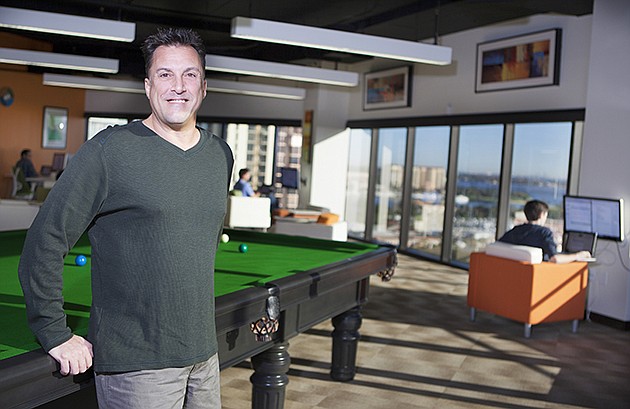- November 24, 2024
-
-
Loading

Loading

Chris Harvey's travel insurance software company Squaremouth is known as a cool place to work in St. Petersburg. With unlimited paid vacation, free flowing beer, and mandatory birthday bonuses that must be spent at a bar or restaurant, Harvey has managed to make what some may assume is a boring industry into something fun. Every time Harvey posts a job opening he receives more than 300 applications.
But building the 26-employee, $14 million “cool” company didn't happen overnight. In fact, the company spent its first five years virtually penniless, according to Harvey. In an industry that's growing, it's tough to predict what's around the corner, other than just assuming the same 10% to 15% growth that it has experienced in the past.
Squaremouth provides a comparison tool for travel insurance products. There are 100 different product offerings, from 20-something insurance companies, and Squaremouth receives a commission based on the product sold. Over the last 30 days, the site has had about 90,000 visitors. With steady growth in sales and staff, Harvey says his goal is to reach $1 million in revenue per employee.
When they started the company, Harvey and his founding partner had experience in building and selling billing software for insurance. But they wanted to find a product that didn't require an 18-month sales cycle, which is how they came up with travel insurance.
“Travel insurance is the easiest insurance you can imagine,” Harvey says. That's because unlike other insurances, when you make the decision to buy, you don't have to wait for underwriting. Travel insurance has no post-sale underwriting. “You just take the credit card and complete the sale,” Harvey says.
When the company was founded in 2001, there were only about six major travel insurance companies. The duo spent the first two years writing the software. In 2003, they launched Quotetravelinsurance.com. By 2005, they scrapped the whole thing and launched a new site, Squaremouth, with their personal finances. Despite earning $1 million in sales in 2006, Harvey found himself within one month of running out of money. Luckily, March 2007 was the first month the company broke even.
In 2009, the company grew to three people and they opened an office. “It took a long time to reach that tipping point,” Harvey says. The company relies mostly on word of mouth as a form of advertising. It also invests in Google Adwords and search engine optimization. “It takes a long time for word of mouth to spread and SEO to kick in,” he adds.
Other forms of advertising would be a waste of money, according to Harvey, because the market the firm is trying to hit is so well defined. It targets only those people who purchased a big trip in the last few weeks.
The company's target market is over age 50, with a hot spot between 60 and 70 years old. People in this group tend to see the value in travel insurance because they know there's a possibility of a medical emergency or potential mishap. “The younger you are the more invincible you feel,” Harvey says. Plus, usually the travelers who purchase a policy from Squaremouth are going on a more expensive trip, so there is more investment to protect.
The company also uses data from its systems to design new products. Last year it introduced its first insurance offering (Tinleg), designed from 10 years of data of what people were looking for in travel insurance. It became the top-selling product in one year.
Part of what makes the company unique is its work environment. “We strip away rules and regulations” that most big companies have, Harvey says. For pay raises, employees pick someone to be their pay raise committee. Everybody knows how much everybody earns and everybody votes on the raise. “All of our books are wide open,” he adds.
One of the company's core values is “f*** it up.” When someone makes a mistake, they announce it, Harvey says. “You embrace it, laugh it off, move on and learn.”
The company does enforce some rules, though. For example, you can never sit in the same desk two days in a row, Harvey says. This helps promote a close-knit team.
As the company continues its climb, Harvey's biggest challenge is managing growth. “Every year it's new,” Harvey says. “I've never run a $14 million company; I'm stumbling in the dark.”